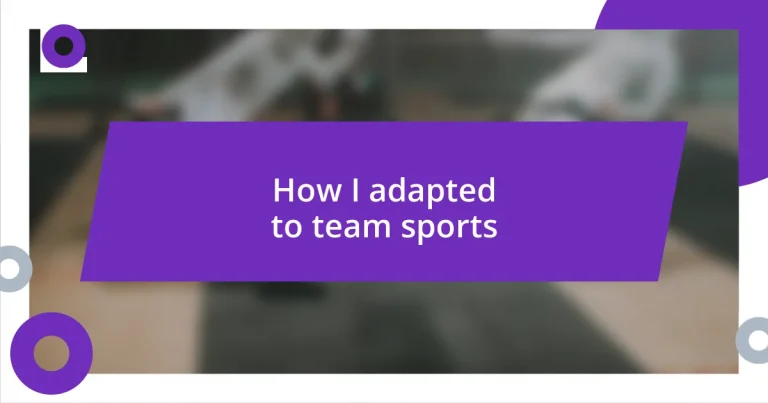Key takeaways:
- Joining a team transformed initial feelings of intimidation into a strong sense of belonging and personal growth through shared experiences.
- Effective communication, including active listening and understanding body language, played a crucial role in building trust and enhancing team dynamics.
- Celebrating achievements, both big and small, strengthened bonds among teammates and highlighted the importance of camaraderie throughout the journey.

My journey to team sports
Thinking back on my early days, I remember standing on the sidelines during recess, watching other kids play soccer. That feeling of wanting to join but not knowing where to start was overwhelming. Do you remember feeling that way too? It sparked a desire in me to find my place within a team.
As I took that first leap into a local basketball league, I felt both excitement and intimidation. It wasn’t just about learning plays; it was about discovering camaraderie and support. I still remember the exhilaration of my first game, that rush of adrenaline mixed with the warmth of encouragement from teammates who once felt like strangers.
Over time, those initial nerves transformed into a profound sense of belonging. Each practice was not just a rehearsal for a game; it became a space where friendships flourished and life lessons emerged. How can a shared goal express who we are as individuals? In hindsight, embracing team sports became a journey into self-discovery, one filled with laughter, failure, and personal growth.

Overcoming initial challenges
Stepping into that first practice was daunting. My heart raced as I fumbled with the basketball, feeling like an outsider. I struggled not just with the skills but with fitting in. It took time to push through that awkwardness, but I realized perseverance was key. I learned that making mistakes was part of the journey, and soon, those blunders became cherished memories.
To make that transition smoother, I focused on strategies that helped me adapt:
– Active Listening: I soaked in feedback from my coach and teammates, which taught me the game quicker.
– Positive Mindset: I reminded myself that everyone was learning together, which eased my self-criticism.
– Open Communication: I started conversations with teammates to build connections, which significantly reduced my anxiety.
– Practice Regularly: Dedicating extra time outside of practices helped me boost my skills and confidence at the same time.
Each of these steps helped me overcome those initial hurdles, allowing me to finally embrace being part of a team.
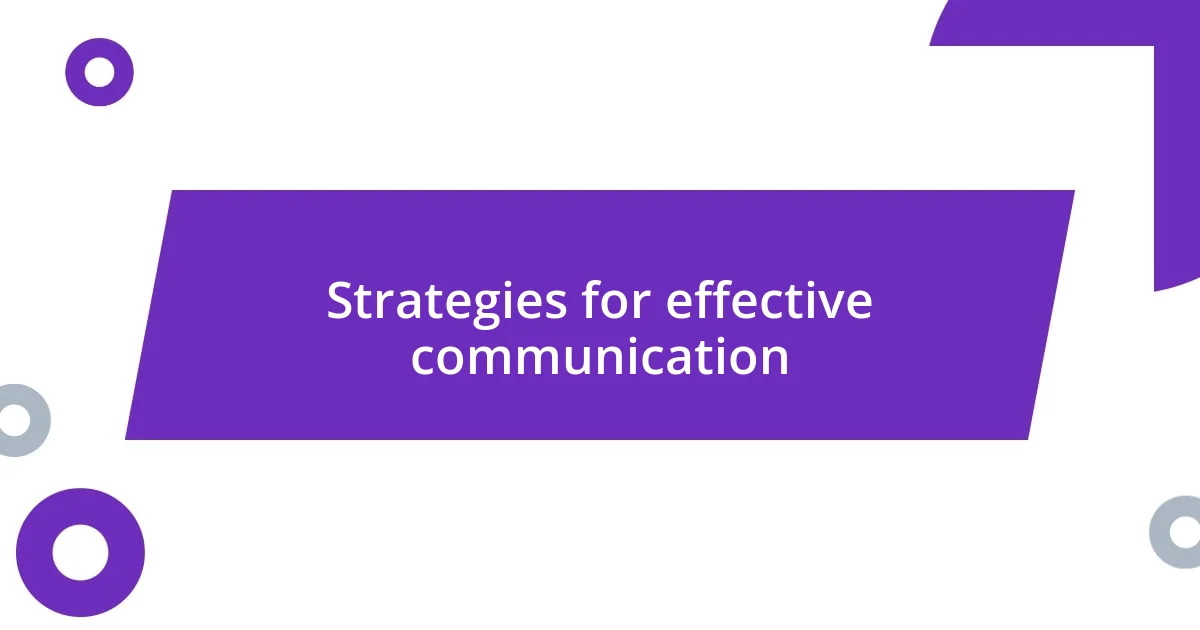
Strategies for effective communication
Effective communication in team sports is essential for building trust and enhancing performance. I remember my first game when my teammate shouted instructions at me. At first, it felt overwhelming, but I soon realized that these loud calls were rooted in their desire for me to succeed. Initially, I struggled with contrasting styles; some teammates wanted direct talk, while others preferred a softer approach. Understanding these nuances helped me communicate more effectively.
I gradually learned the importance of body language. While I was always ready to offer an encouraging smile or a thumbs up, I noticed how a nod or a frown could influence a play’s outcome. Those non-verbal cues sometimes spoke louder than words, especially during high-pressure moments. Have you ever noticed how an encouraging glance can uplift team morale? It’s fascinating how these small gestures can reinforce our connection to one another.
Another strategy I employed was asking for clarification. Early on, I hesitated to do this, fearing it might show weakness. However, I discovered that seeking clarity led to better understanding and stronger team dynamics. This simple shift not only improved my confidence but also signaled to my teammates that I was invested in our collective success. Communication isn’t just about talking; it’s about being open, receptive, and willing to engage.
| Strategy | Description |
|---|---|
| Active Listening | Paying attention to teammates’ feedback to enhance understanding and adaptability. |
| Body Language | Using non-verbal cues to communicate support and engagement during games. |
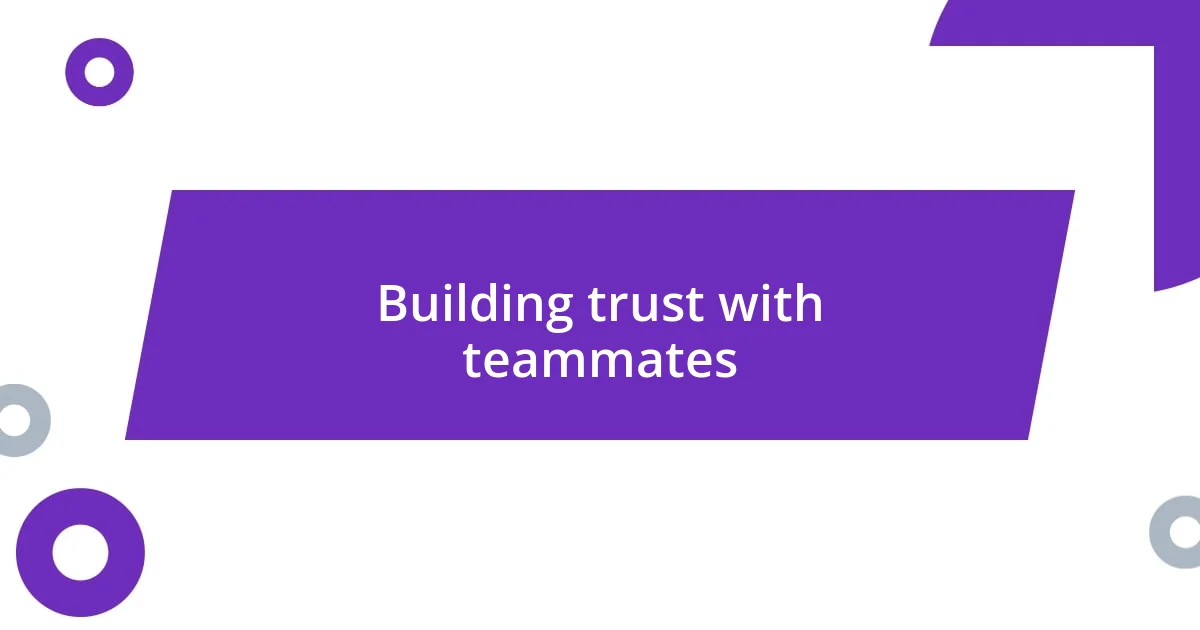
Building trust with teammates
Building trust with teammates was vital for me, especially during those early days on the court. I remember how sharing a laugh after a clumsy play not only eased my nerves but also brought us closer. There’s something about a shared moment of vulnerability that strengthens bonds, don’t you think? When teammates feel safe to be themselves, it fosters an environment where trust can flourish.
A pivotal moment for me was when I decided to share my aspirations with the team. I opened up about my desire to improve and contribute more, which sparked a wave of encouragement. This vulnerability not only deepened my relationships but also inspired others to share their own goals. Have you ever noticed how opening up can shift the dynamics in a group? It invites collective support and accountability, crucial elements in team sports.
Lastly, I learned that consistency in actions speaks volumes. I made it a point to be reliable, showing up to practices and being there for my teammates during tough moments. They began to trust me not just as a player but as a friend. I found that these small, dependable actions built a strong foundation of trust. It’s amazing how, in the world of sports, camaraderie can be established through simple acts of commitment and support.
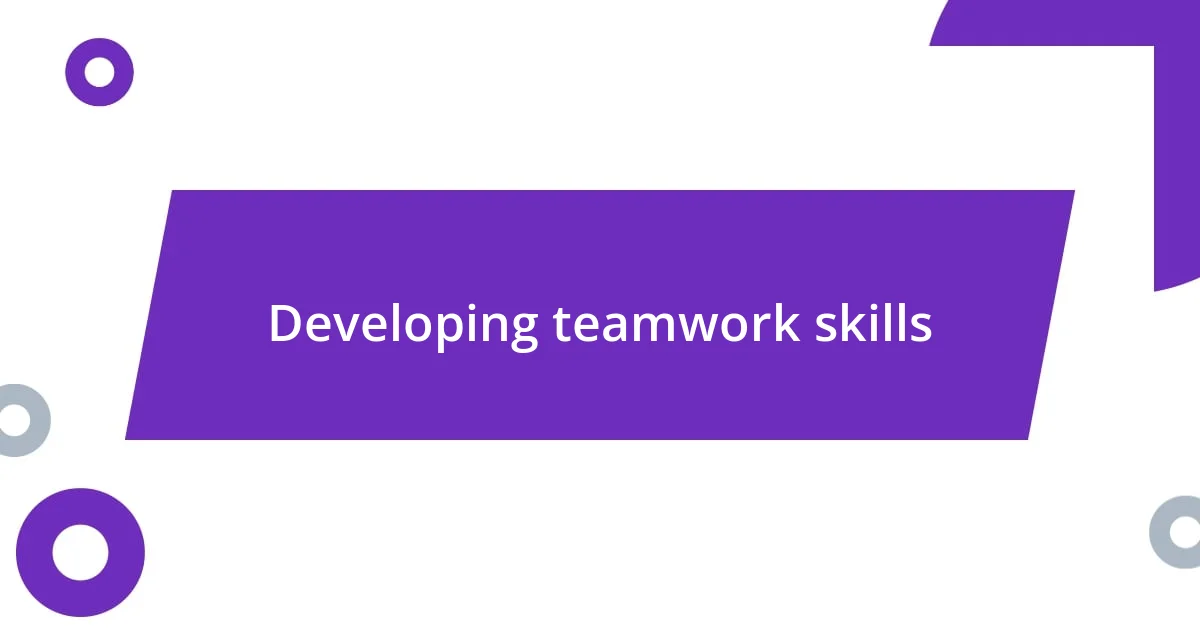
Developing teamwork skills
As I navigated my way through team sports, I recognized that developing teamwork skills went beyond mere tactics; it involved creating a shared sense of purpose. During one memorable season, my team faced a tough opponent, and we were all feeling the pressure. It was during a huddle before the game that I realized how important it was for us to not just strategize but to connect on a personal level. Each of us shared a victory or a challenge, and suddenly, our individual stories intertwined. Have you ever felt that surge of unity just by listening to your teammates? It was powerful.
Collaborating on drills was another effective way to sharpen our teamwork abilities. I recall days when we partnered up for shooting practice, where we encouraged one another between attempts. When I saw a friend struggle, I made it my mission to lift their spirits. Surprisingly, as I cheered them on, I found my own skills improved too! There’s something about fostering a culture of support that elevates everyone. Isn’t it remarkable how helping others can transform your own performance?
Over time, I learned that teamwork is often about embracing vulnerability. In a close game, when I missed a crucial shot, I felt the urge to hide my disappointment. Instead, I chose to express my feelings to my teammates. Their reassurance made me realize we were all in it together, facing our highs and lows as a unit. It struck me that acknowledging our weaknesses featured prominently in building resilience. How can vulnerability actually become a strength within a team? Through shared struggles, we grew not just as athletes but as a cohesive, supportive family.
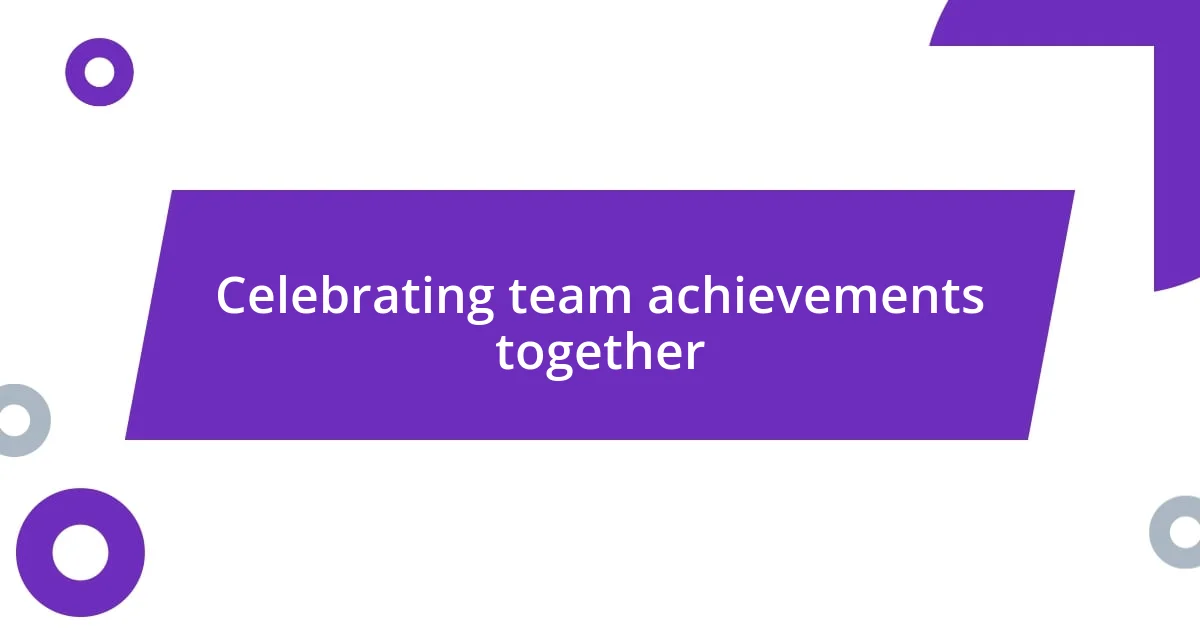
Celebrating team achievements together
There’s an unmatched thrill in celebrating team achievements, isn’t there? I vividly remember our championship win last year. As the final whistle blew, the rush of emotions washed over us—joy, relief, and pure elation. We huddled together, arms thrown around each other, and shared the moment of victory as if it were a lifeline connecting us all. It was a manifestation of our collective hard work, and the weight of every practice, every late-night strategy session seemed to evaporate in that joyous moment.
I think about the post-game celebrations often—it wasn’t just about the trophy or the accolades, but the heartfelt congratulations we exchanged. I recall hugging my teammate Sarah, who had always lifted me during tough times on the court. When she smiled and thanked everyone for their support, it struck me how vital these celebrations were for reinforcing our bond. They were reminders that we all played a part in the triumph. Have you ever noticed how celebrating achievements not only solidifies a team’s success but also kindles lasting friendships?
Even the simple moments mattered. After one impressive game, we took a group photo and immediately decided to create a scrapbook of our season. Flipping through those pages now, I feel a rush of nostalgia. Each snapshot captures more than just players in action; it holds laughter, tears, and the spirit of camaraderie. It makes me wonder—aren’t these memories keys to unlocking deeper connections? Celebrating our achievements, big and small, truly taught me that it’s not just about the wins; it’s about cherishing the journey together.












